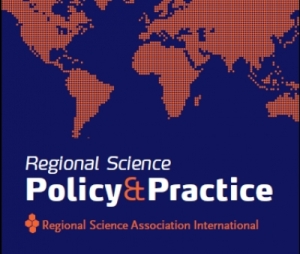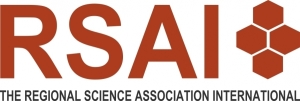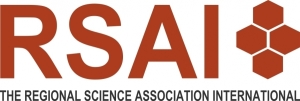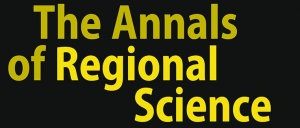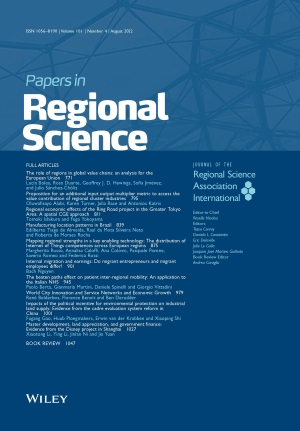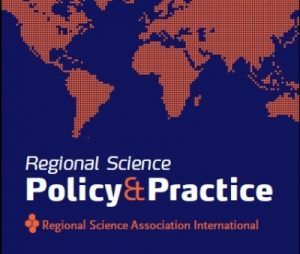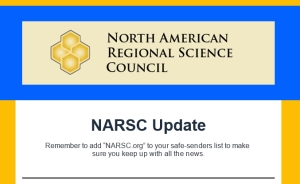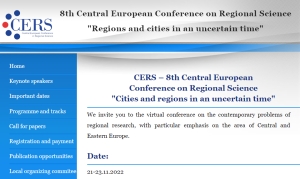RSAI Worldwide
Elisabete Martins
Call for Applications - Editor-in-Chief, Regional Science Policy & Practice (RSPP)
The Regional Science Association International (RSAI) seeks candidates for the position of editor-in-chief of the official journal of the association, Regional Science Policy & Practice (RSPP), starting Jan. 1, 2023 for a three-year term.
RSPP is an international journal that publishes high quality papers in applied regional science that explore policy and practice issues in regional and local development. It welcomes papers from a range of academic disciplines and practitioners including planning, public policy, geography, economics and environmental science and related fields. Papers should address the interface between academic debates and policy development and application. RSPP provides an opportunity for academics and policy-makers to develop a dialogue to identify and explore many of the challenges facing local and regional economies.
Candidates should be RSAI members in good standing, with a wide knowledge of urban and regional phenomena as well as distinguished records of scholarly contributions internationally. Candidates should also possess strong intellectual vision, leadership and organizational abilities, and experience relevant to editing a journal in the field of regional science.
The editor’s primary responsibility is to continue to enhance the journal’s quality, reputation, and scholarship. The editor will be expected to strengthen the journal’s competitive position in support of RSAI’s worldwide mission.
The editor will recommend an international team of associate editors and a book review editor to help administer the peer review process, promote excellence in content and advance editorial initiatives.
The RSPP editor reports to the RSAI Council.
Detailed information on responsibilities and on the process for applying for the editor-in-chief position is available below.
Letters of interest must be received within October 16, 2022.
Specific duties of the Editor-in-Chief and journal editorial office include:
- Maintaining and updating the aims and scope of the journal, editorial policies, and guidelines to authors.
- Overseeing the manuscript peer review process through the publisher’s on-line submission portal in an unbiased, confidential, and timely manner.
- Checking proofs and revisions to proofs.
- Preparing and forwarding accepted manuscripts to the publisher’s production department.
- Coordinating standards and practices across managing editors and managing the workload of each member of the editorial team.
- Maintaining close and regular contact with the publisher on marketing and production matters.
- Initiating and responding to correspondence with authors, managing editors, and reviewers.
- Recruiting, selecting, and appointing RSPP board members that reflect the diversity of regional science and addressing any performance issues.
- Soliciting special issues, selecting guest editors, and providing advice and assistance to guest editors.
- Adhering to the page budget and financial structures set by RSAI. RSAI and the publisher are responsible for managing production, layout, printing, subscriptions, pricing and funding initiatives for society publications.
- Appointing associate editors and a book review editor (to be approved by RSAI Council). The editorial team (editor and associate editors) will be comprised of RSAI members with high stature and respect in the community, and with the expertise to manage the breadth of regional science.
- Serving as a non-voting ex officio member of RSAI Council and other regional science governing bodies.
- Reporting to RSAI Council through regular reports at Council meetings.
- Reporting to the journal editorial board through board meetings held at least once a year.
Application process:
Interested individuals should submit an application package that includes:
- A succinct letter of interest and qualifications, containing an indication of the editorial team;
- A vision statement for the next three to six years of publication of RSPP.
- A curriculum vitae;
- The names and contact information of three references.
All requested information should be submitted by e-mail as a single PDF file to the Executive Director, This email address is being protected from spambots. You need JavaScript enabled to view it., copying Elisabete Martins, This email address is being protected from spambots. You need JavaScript enabled to view it., in the e-mail.
Election of RSAI new Councillor at large
Dear RSAI members,
By RSAI Constitution, nominations for Councilors-at-large “shall be made by the Council after solicitation of suggestions from the members of the Association”. At the end of 2022, the position on the RSAI Council held by Prof. Daniela-Luminita Constantin (Bucharest University of Economic Studies) will expire; we therefore inform that the proposals for a councilor-at-large can be sent to the address This email address is being protected from spambots. You need JavaScript enabled to view it. within September 30, 2022. Candidatures will have to include a professional CV and a photo.
The election of a councilor-at-large for the period 2023-2025 will take place electronically by RSAI members during the month of October 2022.
Best regards,
Call for RSAI Program Nurturing new talent 2023
Nurturing new talent 2023
The RSAI aims to continue promoting the development of Regional Science by nurturing new talent in 2023. The council has therefore pledged resources to co-finance workshops and summer institutes intended to provide substantive training to pre-doctoral researchers, including the presentation of their work and receiving feedback from senior scholars and their peers. It is expected that the selected workshops and institutes will have considerable international geographical coverage.
Organizers of workshops and summer schools fulfilling the above aims are encouraged to submit a two-page case for support, using the included template, within October 9, 2022 to the RSAI secretariat (This email address is being protected from spambots. You need JavaScript enabled to view it.). Individuals are encouraged to consult with their national and supranational sections to allow better coordination among different initiatives.
All applications will be reviewed by the Committee and will have to be formally approved by the RSAI Council. Their decision will be final.
Call for Papers - Special Issue on Climate Change, Carbon Neutrality: The Role of Spatial Economics
“Climate change is a long-term change in the average weather patterns that have come to define Earth’s local, regional and global climates.” (NASA, 2022, accessed August 2nd, 2022). The consequent temperature increases, rising sea levels, ice losses, and increased frequency and severity in extreme weather events (such as hurricanes, heatwaves, wildfires, droughts, floods and land use/land cover changes) significantly affect regional economic development, resource management, urban and regional planning, and the spatial distribution of population and economic activities. It is believed that human activities, particularly fossil fuel burning, is a key driver of climate change since the mid-20th century. Therefore, carbon neutrality has been proposed as a countermeasure to climate change.
To achieve the proposed goal of carbon neutrality, it is important to understand the driving forces and regional economic implications of carbon intensity reduction. To date, transportation, energy and manufacture sectors are still the main contributors to greenhouse emissions in both China and the United States. Standard economic analysis of the externality problems applies here. More importantly, the spatially heterogeneous distributions of climates, population and socio-economic activities generate significant spatial spillover effects. The spatially correlated climate conditions, the spatially connected regional economies, and the interactions between the climate and regional economic systems raise important theoretical and empirical challenges. For instance, how will the spatial correlation and interactions affect the local climate and the consequent optimal design of regional policies?
Any regional breakdowns of global carbon emissions will likely create evident regional disparities. There has been a surge of literature that highlights the importance of spatial agglomeration in affecting environmental performance at a different dimension. The spatial organization of economic activities plays an important role in shaping energy consumption and subsequent carbon emission. Regardless of compact development in cities or sprawled development in sub- and exurban areas, the spatial organization of population and economic activities are closely related to energy consumption either through agglomeration economies in urban areas or the lack of scale economy in sub- and exurban areas. Similarly, as firms make their location choices, the consideration of competition, economies of scale and economies of scope tend to create spatially correlated carbon emissions. Both international and regional trades further complicate the spatial distribution of carbon emissions. These challenging questions offer great opportunities for spatial economists to contribute their expertise and insights for both basic and applied policy-relevant research.
Within this context, the objective of this Special Issue will be on
- how spatial economics could contribute to the regional impacts of climate change, carbon emission and policy designs for carbon neutrality,
- how the climate change, carbon emission and carbon neutral policies affect regional development and disparities,
- how spatial configuration influences energy-based demand and carbon emission,
- what cross-cutting insights may be gained from investigating the role of space in shaping carbon abatement.
This special issue seeks to advance our understanding of the spatial dimensions of climate change, carbon emission and the underlying mechanisms of spatial interactions.
We encourage the submission of research articles with any of the following characteristics (but not limited to):
- Climate change, carbon emissions, carbon-neutral policies and their impacts on the regional development/disparities
- Heterogeneity in carbon emission across space
- Household/firm/industry location and greenhouse gases emission
- Compact cities and energy consumption
- Sprawled development, energy consumption and carbon emission
- Trade, transportation and carbon emission
- Urban planning and energy efficiency
- Spatial model of carbon behavior
- Climate change, urban forms and environmental performance
Special issue submission:
The submission deadline for this special issue is May 31 2023. We seek manuscripts including theoretical models of economic geography and empirical studies on driving forces of carbon emission as well as identifying the impacts of global warming on economic and social outcomes. Authors should submit complete manuscripts by the submission deadline via the Annals of Regional Science online submission system at https://www.editorialmanager.com/arsc/default1.aspx
Guest Editors:
Yong Chen– Department of Applied Economics, Oregon State University, E-mail: This email address is being protected from spambots. You need JavaScript enabled to view it.
Jian Wang – SILC Business School, Shanghai University, E-mail: This email address is being protected from spambots. You need JavaScript enabled to view it.
Xiwei Zhu – School of Economics, Zhejiang University, E-mail: This email address is being protected from spambots. You need JavaScript enabled to view it.
https://www.springer.com/journal/168/updates/23353338
The latest issue of Papers in Regional Science are available! Volume 101, Issue 4, August 2022
|
Papers in Regional Science Pages: 769-1048 August 2022 |
ISSUE INFORMATION
![]() Free Access
Free Access
Pages: 769-770 | First Published: 23 August 2022
FULL ARTICLES
![]() Open Access
Open Access
The role of regions in global value chains: an analysis for the European Union
Lucía Bolea, Rosa Duarte, Geoffrey J. D. Hewings, Sofía Jiménez, Julio Sánchez-Chóliz
Pages: 771-794 | First Published: 07 April 2022
![]() Open Access
Open Access
Oluwafisayo Alabi, Karen Turner, Julia Race, Antonios Katris
Pages: 795-809 | First Published: 15 June 2022
![]() Open Access
Open Access
Regional economic effects of the Ring Road project in the Greater Tokyo Area: A spatial CGE approach
Tomoki Ishikura, Fuga Yokoyama
Pages: 811-837 | First Published: 18 April 2022
Manufacturing location patterns in Brazil
Edilberto Tiago de Almeida, Raul da Mota Silveira Neto, Roberta de Moraes Rocha
Pages: 839-873 | First Published: 11 April 2022
![]() Open Access
Open Access
Margherita Russo, Annalisa Caloffi, Ana Colovic, Pasquale Pavone, Saverio Romeo, Federica Rossi
Pages: 875-900 | First Published: 13 May 2022
![]() Open Access
Open Access
Internal migration and earnings: Do migrant entrepreneurs and migrant employees differ?
Bach Nguyen
Pages: 901-944 | First Published: 23 August 2022
![]() Open Access
Open Access
The beaten paths effect on patient inter‐regional mobility: An application to the Italian NHS
Paolo Berta, Gianmaria Martini, Daniele Spinelli, Giorgio Vittadini
Pages: 945-977 | First Published: 03 May 2022
![]() Open Access
Open Access
World City Innovation and Service Networks and Economic Growth
René Belderbos, Florence Benoit, Ben Derudder
Pages: 979-999 | First Published: 13 June 2022
Fugang Gao, Huub Ploegmakers, Erwin van der Krabben, Xiaoping Shi
Pages: 1001-1025 | First Published: 16 May 2022
Xiaotong Li, Ying Li, Jinlan Ni, Jia Yuan
Pages: 1027-1046 | First Published: 08 April 2022
BOOK REVIEW
The regional economics of technological transformations: Industry 4.0 and servitisation in European regions, By Roberta Capello and Camilla Lenzi, Routledge, London. 2021. 326 pp. ISBN 978–0–36‐767,824‐1, DOI: https://doi.org/10.4324/9781003132998
Lisa De Propris
Pages: 1047-1048 | First Published: 08 April 2022
RSPP Call for Papers | Special Issue on Covid-19 and Cities: Is it merely a short-term crisis or has it changed our cities forever?
Call for papers for RSPP Special Issue on
“Covid-19 and Cities: Is it merely a short-term crisis or has it changed our cities forever?”.
The aim of Regional Science Policy & Practice - RSPP is to promote and diffuse the understanding of human interaction in space; based on sound, rigorous and up-to-date methodologies; and focusing on real and urgent issues for peoples and places, that require adequate policy responses.
Covid-19 started off as a small local epidemic in early 2020 but became so widespread globally that the WHO declared it as a pandemic in March 2020. Covid-19 spreads fast with increased density of people, so understandably cities have been the most affected due to the crisis everywhere. While a lot of research is ongoing on various effects of the pandemic, what is less addressed is the fact whether the effects of Covid-19 are short run or long lasting. For instance, Covid-19 led to lockdowns in many cities of the world including Mumbai, Delhi, Manila, Shanghai, Sydney. In April 2020, a Barclays report estimated that “the absolute economic loss was likely the largest from the shutdown of Kuala Lumpur, Manila, Delhi and Mumbai, ranging from $1 billion-$1.7 billion per week.”
It is not just the economy of these cities that have been adversely impacted, but also livelihood and food security for many migrants in these cities. In some cities, migrants lost their jobs and were food starved. They had no means of transport, so they walked to their hometowns. In contrast, reports are that housing became more affordable during the pandemic in the central parts of cities as it reduced the need for accessing employment there. But Covid-19 may also have led to significant suburbanization and sprawl as many working populations moved to cheaper locations while keeping their jobs in the central part of cities. There is some evidence that Covid-19 led to work from home (WFH) and work from anywhere (WFA) for the skilled labour force, but the unskilled were the ones to be the worst affected as their jobs (cooking, driving, domestic help, construction, and so on) cannot be done from home. Some research also finds that the pandemic pushed the urban poor further into poverty.
In other cities, Covid exposed the poor state of health care infrastructure there. City governments everywhere have had to battle challenges to take on additional responsibilities to cope with the pandemic—including testing, contact tracing, and monitoring. Due to the need for distancing, Covid-19 and the consequent lockdowns have also accelerated the growth of gig work, exemplified by food delivery, e-commerce, and even at-home beauty services.
This call aims to mobilize publications that analyse the effect that Covid-19 has had on various aspects of the urban economy: urban poverty, informal sector and unskilled and skilled labour force, housing, and the gig economy. Below are the questions the one-day conference proposes to answer:
- What is the effect of Covid-19 on the urban economy and job opportunities?
- How has Covid-19 impacted the urban workforce in general?
- How have the marginalized and vulnerable been affected due to Covid-19?
- Are the recoveries/deaths due to Covid-19 dependent on the robustness of healthcare infrastructure in cities?
- What are the effects of Covid-19 on Information and Communication Technology (ICT) infrastructure in cities?
- Has the pandemic made housing more affordable in urban areas?
- Due to Work from Home (WFH) and Work from Anywhere (WFA), has the pandemic made the urban environment more sustainable at all?
- What are the ongoing policy responses of city governments to Covid and related challenges?
- Are there any best practices from which city governments can learn regarding the management of future pandemics?
- What is the effect of Covid-19 on the gig economy and on-demand labour?
- Are these phenomena temporary or have they changed the landscape of our cities for good?
We welcome original, unpublished papers that address the above questions, or any other research questions not mentioned, as they relate to the effect of Covid-19 on cities. We look forward to papers from all parts of the world. Only very high-quality papers will be chosen to be presented at the conference. We are in advanced negotiations with an international journal to publish selected papers.
Submission Guidelines: Interested Authors should submit their paper to the Special Issue “Covid-19 and Cities” until 31 March 2023 to https://rsaiconnect.onlinelibrary.wiley.com/journal/17577802 . Early submissions are encouraged and will be processed immediately. Papers will undergo the normal refereeing process. The papers will be publish once accepted and compiled when there are enough papers to be compiled in a special issue.
Guest Editors
NARSC August Update
|
|||||||||||||||||||||||||||||||||||||||
|
Position of vice-chancelor in South Africa, University of Johannesburg
VICE-CHANCELLOR & PRINCIPAL
Introduction
The University of Johannesburg (UJ) is a vibrant and cosmopolitan comprehensive university anchored in Africa and driven by a powerful strategy focused on attaining global excellence and stature. With an emphasis on innovative thinking and sustainable strategic partnerships, UJ is an international university of choice. The University has a strong emphasis on positioning UJ as a leader in the Fourth Industrial Revolution (4IR).
VICE-CHANCELLOR & PRINCIPAL
(5) Five-year contract renewable subject to performance
The University seeks to appoint a dynamic, decisive, innovative, motivated, qualified, and accomplished leader of high professional and academic standing as the new Vice-Chancellor & Principal of the University of Johannesburg.
The primary responsibilities of the Vice-Chancellor & Principal are to provide executive and academic leadership. The Vice-Chancellor & Principal is the Chief Executive and Accounting Officer, as well as the Legal, Administrative and Academic Head of the University.
The Vice-Chancellor & Principal is accountable to the University Council and is assisted in the management and administration of the University by the members of the Management Executive Committee (MEC).
The Vice-Chancellor & Principal will be expected to, inter-alia:
- Determine, and articulate the University’s Strategic Plan.
- Lead the University’s strategic and executive initiatives per the University’s Strategic Plan.
- Advanced global excellence and stature.
- Advanced scholarship and innovation.
- Advanced Pan-African thought and conversation by promoting 4IR initiatives, sustainable development goals, decolonisation, and metaverse initiatives.
- Build and strengthen internal and external stakeholder relationships.
- Ensure institutional compliance with the relevant statutory and regulatory framework in which the University functions.
- Oversee innovative staff development initiatives, including retention and recruitment.
- Ensure financial sustainability of the institution.
- Respond to the Department of Higher Education and Training (DHET) regarding policy imperatives.
- Provide direction, support, and assistance to the Council on all governance issues and the institution’s business needs.
Requirements:
- Substantive and acknowledged academic stature, with a PhD (or equivalent) as a minimum academic qualification. A postgraduate executive leadership qualification would be an added advantage.
- A minimum of 10 years experience as an academic, with academic administration experience at an executive level.
- Executive management experience at an academic institution of higher learning.
- Established and valuable local and international networks.
- Proven resource, strategic and people management skills, with the ability to lead institutional transformation and change effectively.
- Demonstrated experience in fundraising external to the university environment.
- In-depth knowledge and a strategic understanding of the higher education environment and the challenges faced by universities in South Africa and internationally.
- An understanding of the 4IR and its impact on higher education and society.
- A well respected leader who is able to inspire and motivate the UJ community.
- An ethical leader with outstanding personal qualities of integrity, sound judgement, energy, passion and constructive interpersonal skills.
Terms of appointment:
The position of Vice-Chancellor & Principal is a (5) five-year year contract appointment, with an executive level remuneration and benefits package commensurate with experience and qualifications. The appointment may be renewed for one further term of office subject to performance.
Retirement age:
The normal retirement age is 65 years. Consideration will be given to all candidates who would be able to serve for a (5) five-year term.
Enquiries: Ms Kwinana, tel. (011) 559-2654 Application:
To apply, submit a detailed Curriculum Vitae and a letter of motivation outlining a possible vision and strategic direction for the position. The name and full contact details (including telephone numbers and e-mail addresses) of at least (3) three traceable and credible references, must be included.
Applications must be marked "Confidential" and addressed to the Executive Director: Human Capital Management, and emailed to Ms B Dumezweni at e-mail: This email address is being protected from spambots. You need JavaScript enabled to view it.
Closing date: 19 August 2022
REMINDER: 8th Central European Conference in Regional Science, November 21-23 2022 - CALL FOR ABSTRACTS!
Dear Colleagues!
We are delighted to announce that Call for Abstracts for CERS 2022 Conference is now open!
The European Regional Science Association – Polish, Slovak and Hungarian Sections, and Adam Mickiewicz University in Poznań (Poland) invite scholars, experts, and administration professionals to participate in the 8th Central European Conference in Regional Science, with the main theme "Resilience of cities and regions in an uncertain time" that will be held online on 21-23rd November 2022.
The deadline for Abstract Submission is September 4, 2022. Please note that there is a limit of two presentations per participant. Abstracts should be submitted using the abstract submission portal.
For information on abstract submission, please visit the CERS 2022 Conference website cers.amu.edu.pl. The list of more than 20 themes, special sessions and young scientist session is available at the conference webpage.
The conference is open to a diverse worldwide audience, including academics, experts, and policy makers. It aims to bring together research, ideas, concepts, and experiences and provide a welcoming forum for discussing research and presenting different points of view on the contemporary challenges of cities and regions.
The themes which will be addressed focus on the challenges of meeting the development of urban and regional systems in an uncertain time. Topics such as the economic, social, and environmental challenges in urban, rural, and regional development and transition in uncertain times are essential issues that the CERS 2022 Conference will consider.
If you have any questions, do not hesitate to contact us This email address is being protected from spambots. You need JavaScript enabled to view it.
On behalf of the Organizing Committee
Tomasz Kossowski
Faculty of Human Geography and Planning wgseigp.amu.edu.pl
Adam Mickiewicz University, Poznań, Poland www.amu.edu.pl
European Regional Science Association – Polish Section www.ersa.org.pl
Job Announcement - Assistant/Associate Professor of Urban Climate Resilience and Adaptation Disparities, The Ohio State University
The City & Regional Planning at the Ohio State University is hiring position this fall jointly with other departments. This is a cluster hire of three tenure-track faculty in the area of Climate, Race and Place under the university-wide Race, Inclusion and Social Equity (RAISE) initiative at the rank of Assistant or Associate Professor.
For details, see below.
--------------------------------------------------------------------------------------------------------------------------------------------------
Assistant/Associate Professor of Urban Climate Resilience and Adaptation Disparities
The Ohio State University
Columbus, Ohio, United States
Description
The Ohio State University invites applications for a cluster hire of three tenure-track faculty in the area of Climate, Race and Place under the university-wide Race, Inclusion and Social Equity (RAISE) initiative. The University seeks to elevate its globally recognized expertise in the science of climate change and adaptation to a new level through a cluster hire of faculty who can holistically investigate, using climate data analytics, the racial disparities and social inequities of climate impacts and help shape adaptations sensitive to these disparities across various geographic scales. This cluster hire creates an opportunity to disrupt traditional knowledge structures and to transcend disciplinary barriers by re-centering climate science in the broadest sense. Participating academic units are the Department of Geography, the School of the Environment and Natural Resources, and the Department of Civil, Environment and Geodetic Engineering, jointly with the City and Regional Planning Section, to bring much needed depth of understanding of racial disparities and climate justice. As participating departments, we seek innovative and creative faculty who bring diverse research approaches and life experiences to advance understanding of how people and places are differentially impacted by climate change through a commitment to interdisciplinary collaborations. Partnering institutes provide a university-wide infrastructure to support the success of the faculty hires, including: the Kirwan Institute for the Study of Race and Ethnicity and the Center for Urban and Regional Analysis (working in the area of race and equity across space and places); the Byrd Polar and Climate Research Center and the Global Water Institute (working to expand water access through the Alliance for Navajo Sustainability) as well as the Rattan Lal Center for Carbon Management and Sequestration (working in the area of climate science and adaptation); and the Sustainability Institute and the Translational Data Analytics Institute (to facilitate significant interdisciplinary collaborations).
Additional Information:
This position is one of three faculty appointments in the Climate, Race and Place cluster hire to advance climate justice at The Ohio State University (OSU), and is part of a broader Race, Inclusion and Social Equity (RAISE) initiative focused on narrowing a range of disparities.
This Assistant Professor position is available with the option to be hired into the Provost’s Tenure-Track Fellow to Faculty Program with an appointment to a mentored position as an instructor in the tenure track for up to two-years before transitioning to the Assistant Professor position.
The successful candidate will be expected to develop a nationally-recognized research program focused on racial and ethnic population disparities of resilience and adaptation to climate change events in cities. This position builds upon departmental strengths in natural hazard resilience of infrastructure systems and access to urban services to strengthen the equity framework through which observations are made, research questions framed and solutions advanced. Candidate research areas must align with the broad thematic area of this position announcement at the nexus of race/ethnicity studies, climate change science and urban infrastructure design. Topic areas broadly include, and are not limited to, community vulnerability and response to extreme weather events, community adaptation via a just transition to low-carbon transportation and household energy future, community public health and climate impacts on air and water quality. Applicants may choose which of the two partnering academic units, Department of Civil, Environmental and Geodetic Engineering or City and Regional Planning Section of the Knowlton School of Architecture, is their primary partial appointment (70%) for purposes of promotion review. The other academic unit will constitute their minority appointment (30%) for teaching and research contributions.
Expectations for the position include teaching undergraduate and graduate courses in civil engineering or city and regional planning; establishing and sustaining an active, externally-funded research program toward national and international recognition in the field; advising graduate and undergraduate students; and engaging in outreach and service activities with communities, professional organizations and the university. The successful candidate should be prepared to collaborate across disciplines and work with diverse communities and faculty. The faculty position is full time (9-month) and starts no earlier than January 2023.
The link to the full position description can be found here: https://osu.wd1.myworkdayjobs.com/OSUCareers/job/Columbus-Campus/Assistant-Associate-Professor-of-Urban-Climate-Resilience-and-Adaptation-Disparities_R51060
Requirements
Required Qualifications:
- · A doctoral degree in civil engineering, city and regional planning, or a closely related field prior to the start date of the appointment
- · An established record of research commensurate with prior training and specialization
- · Evidence of potential for developing a nationally recognized research program
- · Interest and ability to engage in research collaborations with faculty in Civil and Geodetic Engineering and The Knowlton School
- · Demonstrated potential for excellence in teaching, and an ability to communicate effectively with faculty and students
Preferred Qualifications:
- · Professional experience such as post-doctoral and other research positions in academia, national labs, and industry in related fields
- · Demonstrated experience collaborating on interdisciplinary initiatives
- · Experience working with diverse populations and commitment to diversity/inclusivity
- · Professional engineering or planning licensure or the ability to obtain registration
How to Apply:
Please submit the following documents with your application:
- · Cover Letter
- · Curriculum Vita
- · Diversity Statement(describe experiences, current interests or activities, and/or future goals that promote a climate that values diversity and inclusion in one or more of the areas of scholarship, instruction and outreach)
- · Statement of Research(describe the evolution of research, highlight research accomplishments, and provide a clear vision for future research)
- · Statement of Teaching Interests
- · Names and contact information of FIVE referencescommensurate with the rank sought
Review of applications will begin on September 15, 2022 and continue until the position is filled.
Here is the link: https://knowlton.osu.edu/assistantassociate-professor-urban-climate-resilience-and-adaptation-disparities
About Us
The Regional Science Association International (RSAI), founded in 1954, is an international community of scholars interested in the regional impacts of national or global processes of economic and social change.

